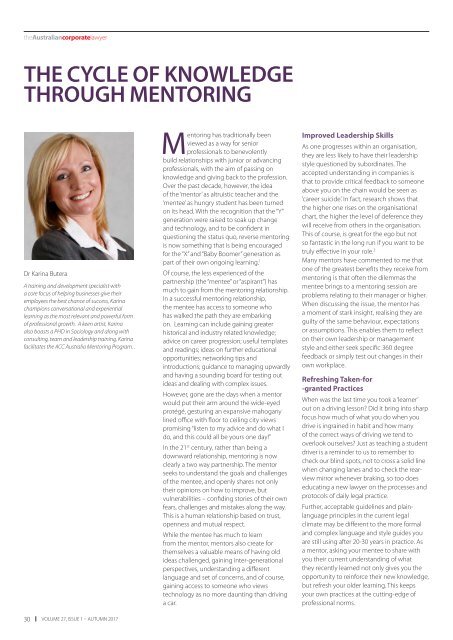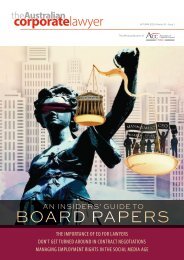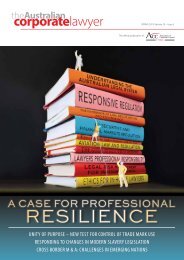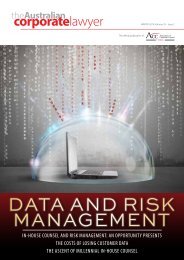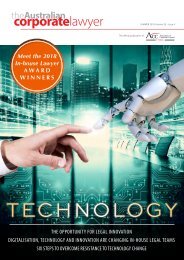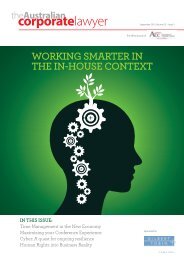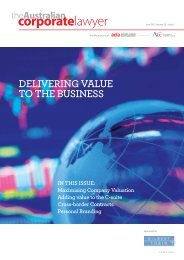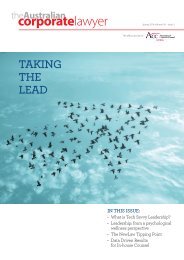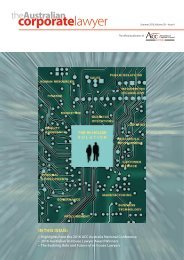Australian Corporate Lawyer - Autumn 2017
Australian Corporate Lawyer is the official publication of the Association of Corporate Counsel (ACC) Australia. The Autumn 2018 issue focuses on 'The Law and Technology' and features a range of articles covering topics including: the future of contracts and; the future of law firms as software companies..
Australian Corporate Lawyer is the official publication of the Association of Corporate Counsel (ACC) Australia. The Autumn 2018 issue focuses on 'The Law and Technology' and features a range of articles covering topics including: the future of contracts and; the future of law firms as software companies..
Create successful ePaper yourself
Turn your PDF publications into a flip-book with our unique Google optimized e-Paper software.
the<strong>Australian</strong>corporatelawyer<br />
THE CYCLE OF KNOWLEDGE<br />
THROUGH MENTORING<br />
Dr Karina Butera<br />
A training and development specialist with<br />
a core focus of helping businesses give their<br />
employees the best chance of success, Karina<br />
champions conversational and experiential<br />
learning as the most relevant and powerful form<br />
of professional growth. A keen artist, Karina<br />
also boasts a PHD in Sociology and along with<br />
consulting, team and leadership training, Karina<br />
facilitates the ACC Australia Mentoring Program. .<br />
Mentoring has traditionally been<br />
viewed as a way for senior<br />
professionals to benevolently<br />
build relationships with junior or advancing<br />
professionals, with the aim of passing on<br />
knowledge and giving back to the profession.<br />
Over the past decade, however, the idea<br />
of the ‘mentor’ as altruistic teacher and the<br />
‘mentee’ as hungry student has been turned<br />
on its head. With the recognition that the “Y”<br />
generation were raised to soak up change<br />
and technology, and to be confident in<br />
questioning the status quo, reverse mentoring<br />
is now something that is being encouraged<br />
for the “X” and “Baby Boomer” generation as<br />
part of their own ongoing learning. 1<br />
Of course, the less experienced of the<br />
partnership (the “mentee” or “aspirant”) has<br />
much to gain from the mentoring relationship.<br />
In a successful mentoring relationship,<br />
the mentee has access to someone who<br />
has walked the path they are embarking<br />
on. Learning can include gaining greater<br />
historical and industry related knowledge;<br />
advice on career progression; useful templates<br />
and readings; ideas on further educational<br />
opportunities; networking tips and<br />
introductions; guidance to managing upwardly<br />
and having a sounding board for testing out<br />
ideas and dealing with complex issues.<br />
However, gone are the days when a mentor<br />
would put their arm around the wide-eyed<br />
protégé, gesturing an expansive mahogany<br />
lined office with floor to ceiling city views<br />
promising “listen to my advice and do what I<br />
do, and this could all be yours one day!”<br />
In the 21 st century, rather than being a<br />
downward relationship, mentoring is now<br />
clearly a two way partnership. The mentor<br />
seeks to understand the goals and challenges<br />
of the mentee, and openly shares not only<br />
their opinions on how to improve, but<br />
vulnerabilities – confiding stories of their own<br />
fears, challenges and mistakes along the way.<br />
This is a human relationship based on trust,<br />
openness and mutual respect.<br />
While the mentee has much to learn<br />
from the mentor, mentors also create for<br />
themselves a valuable means of having old<br />
ideas challenged, gaining inter-generational<br />
perspectives, understanding a different<br />
language and set of concerns, and of course,<br />
gaining access to someone who views<br />
technology as no more daunting than driving<br />
a car.<br />
Improved Leadership Skills<br />
As one progresses within an organisation,<br />
they are less likely to have their leadership<br />
style questioned by subordinates. The<br />
accepted understanding in companies is<br />
that to provide critical feedback to someone<br />
above you on the chain would be seen as<br />
‘career suicide.’ In fact, research shows that<br />
the higher one rises on the organisational<br />
chart, the higher the level of deference they<br />
will receive from others in the organisation.<br />
This of course, is great for the ego but not<br />
so fantastic in the long run if you want to be<br />
truly effective in your role. 2<br />
Many mentors have commented to me that<br />
one of the greatest benefits they receive from<br />
mentoring is that often the dilemmas the<br />
mentee brings to a mentoring session are<br />
problems relating to their manager or higher.<br />
When discussing the issue, the mentor has<br />
a moment of stark insight, realising they are<br />
guilty of the same behaviour, expectations<br />
or assumptions. This enables them to reflect<br />
on their own leadership or management<br />
style and either seek specific 360 degree<br />
feedback or simply test out changes in their<br />
own workplace.<br />
Refreshing Taken-for<br />
-granted Practices<br />
When was the last time you took a ‘learner’<br />
out on a driving lesson? Did it bring into sharp<br />
focus how much of what you do when you<br />
drive is ingrained in habit and how many<br />
of the correct ways of driving we tend to<br />
overlook ourselves? Just as teaching a student<br />
driver is a reminder to us to remember to<br />
check our blind spots, not to cross a solid line<br />
when changing lanes and to check the rearview<br />
mirror whenever braking, so too does<br />
educating a new lawyer on the processes and<br />
protocols of daily legal practice.<br />
Further, acceptable guidelines and plainlanguage<br />
principles in the current legal<br />
climate may be different to the more formal<br />
and complex language and style guides you<br />
are still using after 20-30 years in practice. As<br />
a mentor, asking your mentee to share with<br />
you their current understanding of what<br />
they recently learned not only gives you the<br />
opportunity to reinforce their new knowledge,<br />
but refresh your older learning. This keeps<br />
your own practices at the cutting-edge of<br />
professional norms.<br />
30 VOLUME 27, ISSUE 1 – AUTUMN <strong>2017</strong>


